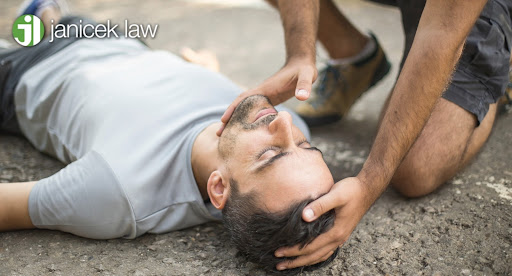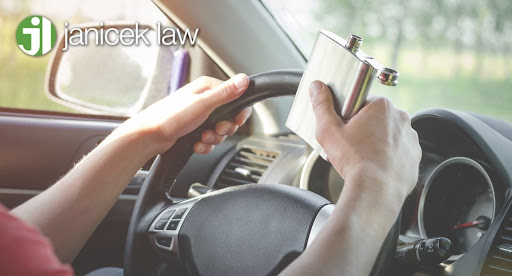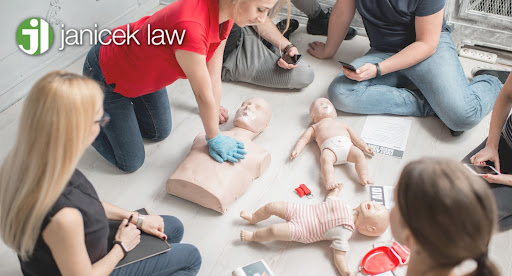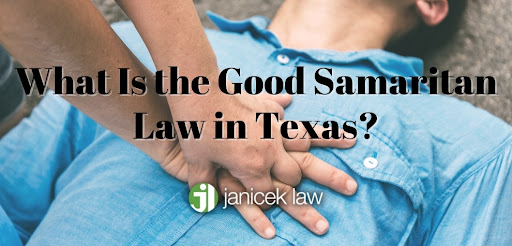A good Samaritan helps others in need and expects nothing in return. This applies especially to strangers during an emergency. The Texas Good Samaritan Act protects those who lend a helping hand in medical emergencies.
Many people are afraid to help in critical situations, fearing they may be held legally liable for causing further injuries while aiding the injured person. Knowing about this law could reduce your worry about legal penalties if you render aid in good faith at a car accident scene in Texas.
A San Antonio personal injury attorney has extensive knowledge of the Good Samaritan laws in Texas. Contact the experienced legal team at Janicek Law today at (210) 366-4949 to determine how this law could affect your personal injury claim.
What Is the Texas Good Samaritan Law?
Texas Civil Practice and Remedies Code § 74.151, also known as the state’s Good Samaritan Law, is defined as “a person who in good faith administers emergency care is not liable in civil damages for an act performed during the emergency.” In other words, this law protects someone if something goes wrong while they’re rendering aid.
Without this law, fewer people would be willing to help for fear of being held liable for additional injuries. Texas encourages more people to step up and help in emergencies. Because of Good Samaritan laws, volunteers can help without the threat of liability for harm or civil repercussions. No one wants to be sued for helping to save someone’s life.
Fatal traffic accidents are rising, per the National Highway Transportation Safety Administration (NHTSA). But the good news is that many health care professionals believe that U.S. traffic deaths can be decreased by Good Samaritan protection.

Examples of Good Samaritan Acts
Those who selflessly help and protect others during an emergency will receive protection from the Good Samaritan Law Texas. In other words, they wouldn’t be held financially liable for any damages if they acted in good faith. Listed below are a few examples of good samaritan acts that are protected by the Texas law.
- A bystander performs CPR on a drowning swimmer but accidentally breaks one of their ribs in the process.
- A witness pulls a car accident victim from a vehicle, but their shoulder dislocates in the process.
- Someone sees a baby locked in a vehicle on a hot summer day and breaks the car window to save them. The baby is rescued but suffers a few scratches from broken glass.
What Are the Exceptions to the Texas Good Samaritan Law?
However, there are exceptions to the protections offered by the Good Samaritan Law Texas. A person who renders aid may be held liable for willful or wanton negligence.
Exceptions to the Good Samaritan Act Texas include:
- Purposely causing harm to the already distressed person.
- Expecting compensation for rendering aid as a medical professional.
- Being present at the emergency scene only for the sake of soliciting business.
- Rendering aid as an admitting physician.
- Being the one who injured the victim in the first place. For example, an at-fault driver who caused the victim’s injuries will likely face liability for their carelessness.
It’s important that you speak with a Texas personal injury law firm if you’re accused of harming someone you helped in an emergency medical crisis. Additionally, if you think you suffered personal injuries due to a caregiver’s wanton negligence, you have legal rights too. Call Janicek Law today and we’ll fight for your justice.

Reasonable Standards
Avoiding liability hinges on whether the caregiver’s actions are judged within reasonable standards. In other words: did they react like any reasonable person would in similar circumstances?
If a judge or jury believes the Good Samaritan exhibited the actions of a reasonable person, then the Texas Good Samaritan Act will likely protect them. Conversely, if they believe the Good Samaritan harmed the victim through willful or wanton negligence, they may be deemed liable.
Liability Issues and The Texas Good Samaritan Act
The medical community calls the hour following an accident the “golden hour.” That’s because, during this period, even emergency aid from an inexperienced person can keep a victim alive. However, victims often receive more injuries and sometimes die after a Good Samaritan offers emergency medical assistance. The average person doesn’t have the medical knowledge and ability to help an injured person effectively.
The law states, “A person who in good faith administers emergency care at the scene of an emergency or in a hospital is not liable in civil damages for an act performed during the emergency unless the act is willfully or wantonly negligent.”
Someone genuinely trying to help another person is protected from liability under the law as long as they act in good faith.

What Is the Good Samaritan Law for CPR?
The Good Samaritan Law Texas also protects people who perform emergency CPR. However, it must be obvious that the victim needs CPR.
Good Samaritans can still be held liable in an emergency if their efforts to provide aid are proven to be rooted in bad faith.
What Is the Good Samaritan 911 Law?
When calling 911, the same Good Samaritan acts still apply. Liability becomes an issue when a person does not act in good faith when providing emergency care. So it’s essential for good samaritans to be honest with the 911 dispatcher because a fraudulent call can lead to civil liability.
Please note that most Good Samaritan laws address civil liability at the state level. State or federal civil liability can still factor into a Good Samaritan’s actions.
In-Flight Medical Emergencies
In the U.S., off-duty physicians and other medical professionals are under no legal obligation to provide medical assistance during in-flight emergencies. However, they may have an ethical duty to do so.
The Federal Aviation Assistance Act of 1998 provides legal protections to Good Samaritans rendering aid during emergencies aboard planes. You are covered whether a U.S. company owns the airliner or not. However, the laws on intercontinental flights vary according to the country’s laws where the airline is owned.
How To Protect Yourself When Helping Someone in an Emergency Situation
Although anyone can step in to help in an emergency, no one wants to be sued and held civilly liable for acting as a Good Samaritan. This applies whether you’ve had medical training or not.
Taking a First Aid, CPR, and AED (automated external defibrillators) class will give you the necessary skills when it comes to administering basic emergency services. Classes like these are quite literally life savers.

When to Speak to an Attorney About Good Samaritan Law Issues
A San Antonio personal injury attorney is beneficial in complex car accident cases, whether you are a Good Samaritan or the injured party.
It can be tough to interpret Texas Good Samaritan laws and their exceptions on your own. Contact Janicek Law for a free consultation to discuss the circumstances surrounding your accident or injury. Our legal team is available today by phone or online through our website’s live chat option.
Contact a San Antonio Good Samaritan Law Attorney
At Janicek Law, we want to ensure that all Good Samaritans are protected for saving a life or attempting to save a life. Additionally, we want to ensure that car accident victims, for example, who were further injured through bad faith receive justice. If you are involved in either of those scenarios, call us at (210) 366-4949 today. We’ll review your case and determine whether it falls within the legal bounds of the Good Samaritan Law Texas.

